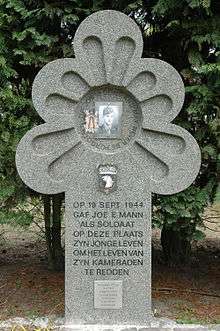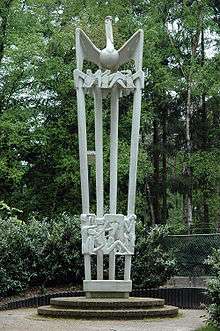Joe E. Mann
| Joe Eugene Mann | |
|---|---|
 Joe Mann monument at the place of his death. The inscription reads: "On 19 September 1944, Joe E. Mann as soldier at this place gave his young life to save the lives of his comrades." | |
| Born |
July 8, 1922 Reardan, Washington |
| Died |
September 19, 1944 (aged 22) Best, the Netherlands |
| Place of burial | Greenwood Memorial Terrace, Spokane, Washington |
| Allegiance | United States of America |
| Service/branch | United States Army |
| Years of service | 1942 - 1944 |
| Rank | Private First Class |
| Unit | 502nd Parachute Infantry Regiment, 101st Airborne Division |
| Battles/wars | World War II |
| Awards |
Medal of Honor Bronze Star Purple Heart (5) |

Joe Eugene Mann (July 8, 1922 – September 19, 1944) was a United States Army soldier and a recipient of the United States military's highest decoration—the Medal of Honor—for his actions in World War II.
Biography
Mann joined the Army from Seattle, Washington in August 1942,[1] and by September 18, 1944 was serving as a private first class in Company H, 502nd Parachute Infantry Regiment, 101st Airborne Division. On that day, in Best, the Netherlands, he single-handedly destroyed an enemy emplacement and continued to fire on the enemy from an exposed position until being wounded. Despite his wounds, he insisted on serving guard duty during the night. The next morning, during an enemy attack, Mann smothered the blast of a hand grenade with his body, sacrificing himself to protect those around him. For these actions, he was posthumously awarded the Medal of Honor a year later, on August 30, 1945.
Mann, aged 22 at his death, was buried in Greenwood Memorial Terrace, Spokane, Washington.
Medal of Honor citation
Private First Class Mann's official Medal of Honor citation reads:
He distinguished himself by conspicuous gallantry above and beyond the call of duty. On 18 September 1944, in the vicinity of Best, Holland [sic], his platoon, attempting to seize the bridge across the Wilhelmina Canal, was surrounded and isolated by an enemy force greatly superior in personnel and firepower. Acting as lead scout, Pfc. Mann boldly crept to within rocket-launcher range of an enemy artillery position and, in the face of heavy enemy fire, destroyed an 88mm. gun and an ammunition dump. Completely disregarding the great danger involved, he remained in his exposed position, and, with his M-1 rifle, killed the enemy one by one until he was wounded 4 times. Taken to a covered position, he insisted on returning to a forward position to stand guard during the night. On the following morning the enemy launched a concerted attack and advanced to within a few yards of the position, throwing hand grenades as they approached. One of these landed within a few feet of Pfc. Mann. Unable to raise his arms, which were bandaged to his body, he yelled "grenade" and threw his body over the grenade, and as it exploded, died. His outstanding gallantry above and beyond the call of duty and his magnificent conduct were an everlasting inspiration to his comrades for whom he gave his life.
Honored in ship naming
The United States Army ship USAT Private Joe E. Mann was in service from 31 October 1947 until she was transferred to the Navy on 7 Aug 1950.
Memorial
In remembrance of Mann, a memorial monument was placed at the site of his death. Near the same site, an open-air theater (which remains in use today) was named after him. An adjacent road also carries his name.
See also
References
External links
- "Joe E. Mann". Claim to Fame: Medal of Honor recipients. Find a Grave. Retrieved January 21, 2008.
- The short film The Joe Mann Story (1960) is available for free download at the Internet Archive
- "Medal of Honor recipients - World War II (M-S)". Medal of Honor citations. United States Army Center of Military History. June 8, 2009. Retrieved January 8, 2008.